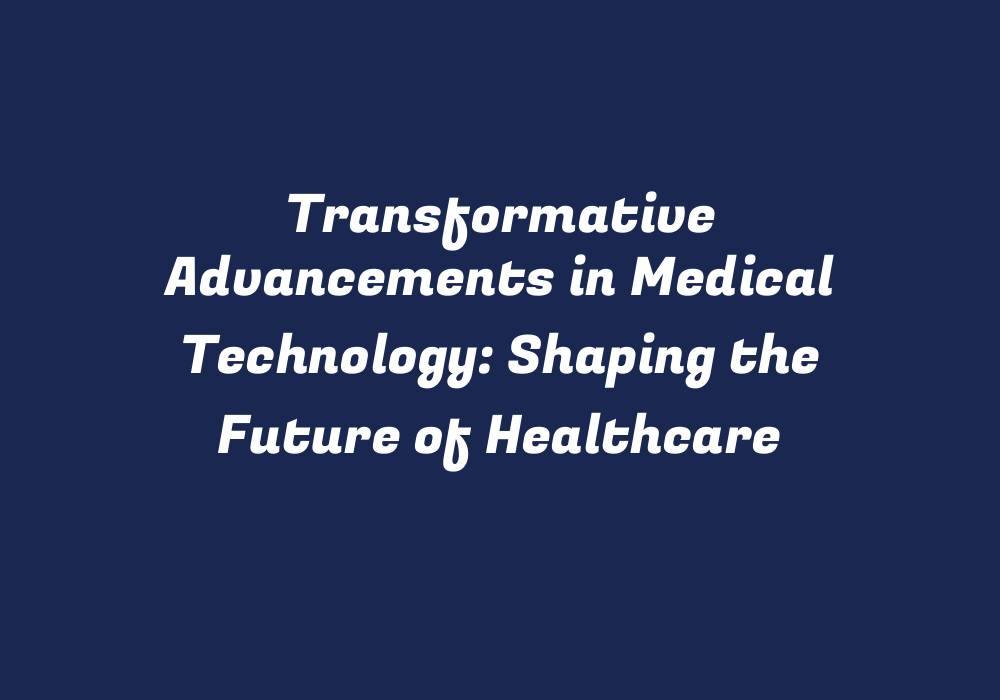Introduction
In this article, we will be exploring the transformative advancements in medical technology that are changing and improving healthcare as we know it. These advancements have the potential to significantly alter how we approach medicine, prevent disease, and manage illness. From artificial intelligence and 3D printing to personalized medicine, these innovations are shaping a new era for healthcare worldwide.
Artificial Intelligence (AI) in Healthcare
One of the most significant transformative advancements in medical technology is Artificial Intelligence. AI has been used in various applications across the medical field, including medical imaging analysis, diagnosis assistance, and clinical decision-making support. It offers a level of efficiency that traditional human methods can’t match, resulting in improved patient outcomes and cost savings for healthcare systems.
Applications of AI in Medical Imaging Analysis have revolutionized the way radiologists interpret complex scans, reducing errors and increasing speed. For instance, IBM Watson Health has been successfully trained to identify patterns in medical images and provide accurate diagnoses.
AI can also aid in clinical decision-making by analyzing patient data from multiple sources, such as electronic health records (EHRs), laboratory results, and other clinical information. By leveraging big data and machine learning algorithms, AI can help doctors make informed decisions about appropriate treatments and personalized care for patients.
3D Printing Technology in Medicine
3D printing technology has found its way into medical applications, offering new possibilities for personalized healthcare solutions. The ability to create customized implants and surgical tools based on individual patient data is transforming the way doctors approach complex procedures, leading to improved outcomes and reduced complications.
Medical 3D printing can be used in a wide range of fields, including orthopedics, cardiology, dentistry, and more. For instance, 3D-printed hearing devices tailored to each patient’s unique ear canal shape are becoming increasingly popular due to their improved fit and comfort. Similarly, surgeons can now create personalized surgical guides that improve the accuracy of complex procedures such as hip replacements or spinal surgeries.
Personalized Medicine: From Precision to Prevention
Personalized medicine is an approach focused on tailoring diagnosis, prevention, and treatment strategies to an individual’s unique genetic profile, lifestyle, and medical history. It aims to improve the effectiveness of treatments while minimizing side effects by targeting specific disease processes or markers. The advancements in genomics and molecular biology are driving this revolution in healthcare delivery.
By using next-generation sequencing technologies, researchers can now analyze a patient’s entire genome for potential genetic variations that may lead to disease susceptibility, treatment response, or drug side effects. This information can be used to develop personalized therapies that address these specific factors and thus offer the best chance of success.
Preventive medicine is also taking advantage of personalized approaches by using a patient’s genetic profile to predict their risk for developing certain diseases. This knowledge allows healthcare professionals to implement preventative measures early on, reducing the likelihood of illness or disease progression. For example, understanding an individual’s unique predisposition towards developing diabetes can facilitate targeted lifestyle interventions and potentially prevent or delay the onset of this chronic condition.
Telemedicine and eHealth Solutions
Technological advancements have not only improved medical care within healthcare facilities but have also extended the reach of medicine to remote areas. Telemedicine and eHealth solutions are allowing doctors to provide consultation and care via video conferencing, telephone calls, or secure messaging platforms, thus making medical expertise more accessible to patients in rural and underserved communities.
Telemedicine is particularly useful for monitoring chronic conditions and providing ongoing support to patients who require frequent check-ins with their healthcare providers. The use of remote patient monitoring devices can also help detect early signs of illness or disease progression, enabling timely interventions and better management of health issues.
Future Prospects for Medical Technology Advancements
As we look towards the future, more disruptive medical technology advancements are poised to revolutionize healthcare even further. Nanotechnology, which involves the manipulation of matter at a molecular level, has shown promise in the development of innovative treatments and diagnostic tools. For example, nanoparticles can be used for targeted drug delivery or as biomarkers for early disease detection.
Additionally, stem cell therapies hold great potential in regenerative medicine by allowing damaged tissues to repair themselves through the use of adult stem cells. These advancements could pave the way for new approaches to treating chronic conditions and tissue loss resulting from injury or disease.
Conclusion
Transformative advancements in medical technology are shaping a future where healthcare becomes more efficient, effective, and personalized than ever before. By leveraging AI, 3D printing, personalized medicine, telemedicine, and other emerging technologies, medical practitioners can provide better care for patients while reducing costs associated with traditional healthcare systems. As these advancements continue to progress, the potential for improved patient outcomes, greater accessibility of medical expertise, and a more preventive approach to healthcare is becoming increasingly evident.
